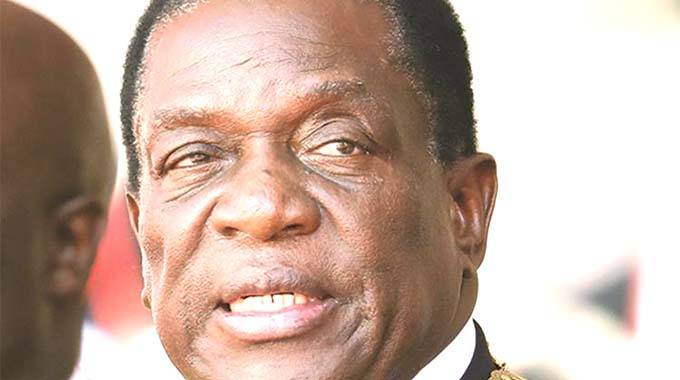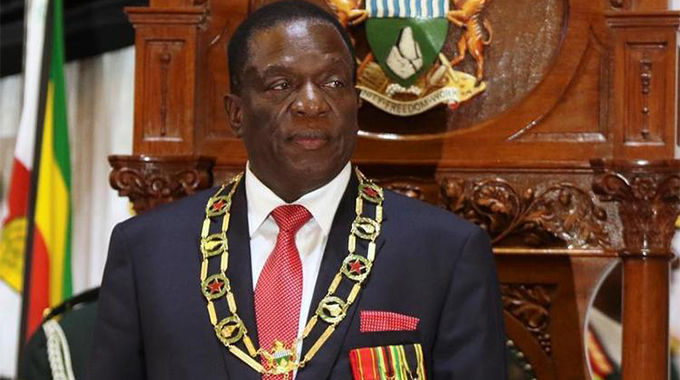ED strikes right chord on economy

Golden Sibanda Senior Business Reporter
President Mnangagwa struck the right chords for necessary economic reforms when he asserted during his inauguration speech in Harare on Sunday that Government will take measures to correct fiscal imbalances threatening to undermine viability of the financial sector.
Multi-lateral lender, the World Bank, shared similar sentiments on public expenditure when it said last year that resolving the cash and foreign currency shortages and sustaining growth in Zimbabwe required bold measures that strike at the root to correct the fiscal imbalances.
Zimbabwe’s fiscal deficit surged to 14,7 percent of gross domestic product (GDP) in 2017 from 8,75 percent in 2016 and 2,4 percent in 2015, according to Treasury’s consolidated statement of financial performance for the financial period ended December 31, 2017.
International best practice dictates that national budget deficits of 2,5 percent or less are recommended.
To that end the President, who was inaugurated as the second executive President of Zimbabwe at the National Sports Stadium on Sunday after his victory in the July 30 harmonised polls, said necessary steps will be taken to create fiscal space through rationalisation and cost cutting measures to cut down public expenditure in tandem with available resources.
Reserve Bank of Zimbabwe governor Dr John Mangudya, told The Herald Business in an interview this week that the President was on point on his promise to institute measures to correct fiscal imbalances, which have been the main driver of aggregate and pressure on banks for cash.
About 93 percent of Government spending in Zimbabwe goes to recurrent expenditure with little to spare to invest towards capital formation.
Fiscal imbalances, which saw public debt skip 1 400 percent to $6,3 billion over the five years to 2017, have mostly been financed through issuance of Treasury Bills and overdrafts with the RBZ.
The President said the excessive liquidity in the domestic market resulted from fiscal imbalances.
The excess liquidity from expansionary Government spending is disproportional to the level of production in the economy, a phenomenon driving aggregate demand, cash shortages and distortions on the foreign exchange market.
“Measures will be taken to correct fiscal imbalances that threaten to undermine the viability of the financial sector, as reflected through the spiralling cash shortages and distortions plaguing the foreign exchange market,” the President said in his inauguration speech on Sunday.
Dr Mangudya concurred with the President’s sentiments that it was critical to address issues of the Government’s skewed expenditures ahead of currency reforms to come in future in order to deal with distortions prevailing on the foreign exchange market and cash shortages.
“His excellence the President struck the right chords with his message promising to institute fiscal consolidation, which will reduce pressure on the financial sector. His message shows that he is fully aware of the impact of fiscal imbalance on the cash situation,” the governor said.
Dr Mangudya said once pressure is reduced on the banking sector, there will consequently be less pressure on parallel market foreign exchange premiums, which are now hovering around 60 percent and 100 percent.
This comes as imports continue to soar, rising to 2,87 billion between February and June this year from $2,25 billion last year in the same period last year. It is believed some of the imports constitute non-essentials or goods which local industry could produce if capacitated.
Part of the demand for cash, goods and forex needed to import stems from the excess liquidity that has found its way on to the market, but which is not backed by real production in the economy.
“Fiscal imbalances are the elephant in the room in the adjustment of the economy. The President also rightly indicated that this process will be supported through reengagement with the west and rest of the world, which will open access to foreign finance,” Dr Mangudya said.
The central bank chief said access to significant amount of foreign exchange, for more than two decades of international isolation, was a critical requirement in rebalancing the domestic economy.
He said this perfectly dovetailed with his pledge and popular mantra he has propagated since his rise to power in November last year, that ‘Zimbabwe is Open for Business’, a commitment he reiterated on Sunday.
The President said the successful realisation of Government’s vision 30 will require concerted and disciplined implementation of radical economic reforms targeted at attracting foreign and domestic investment in line with the reality that “Zimbabwe is Open for Business.”
“Through the engagement and reengagement policy we are opening a new chapter in our relations with the world,” the President said, adding now that elections were over focus will shift to the economy.
President Mnangagwa said building on achievements in agriculture, mining, tourism, manufacturing and infrastructure over the last nine months; Government will consolidate the growth of the economy.
“We will modernise major roads, airports, railways and border posts. Through modern infrastructure, we will connect Zimbabweans to each other, to the region and to the world,” he said.









Comments